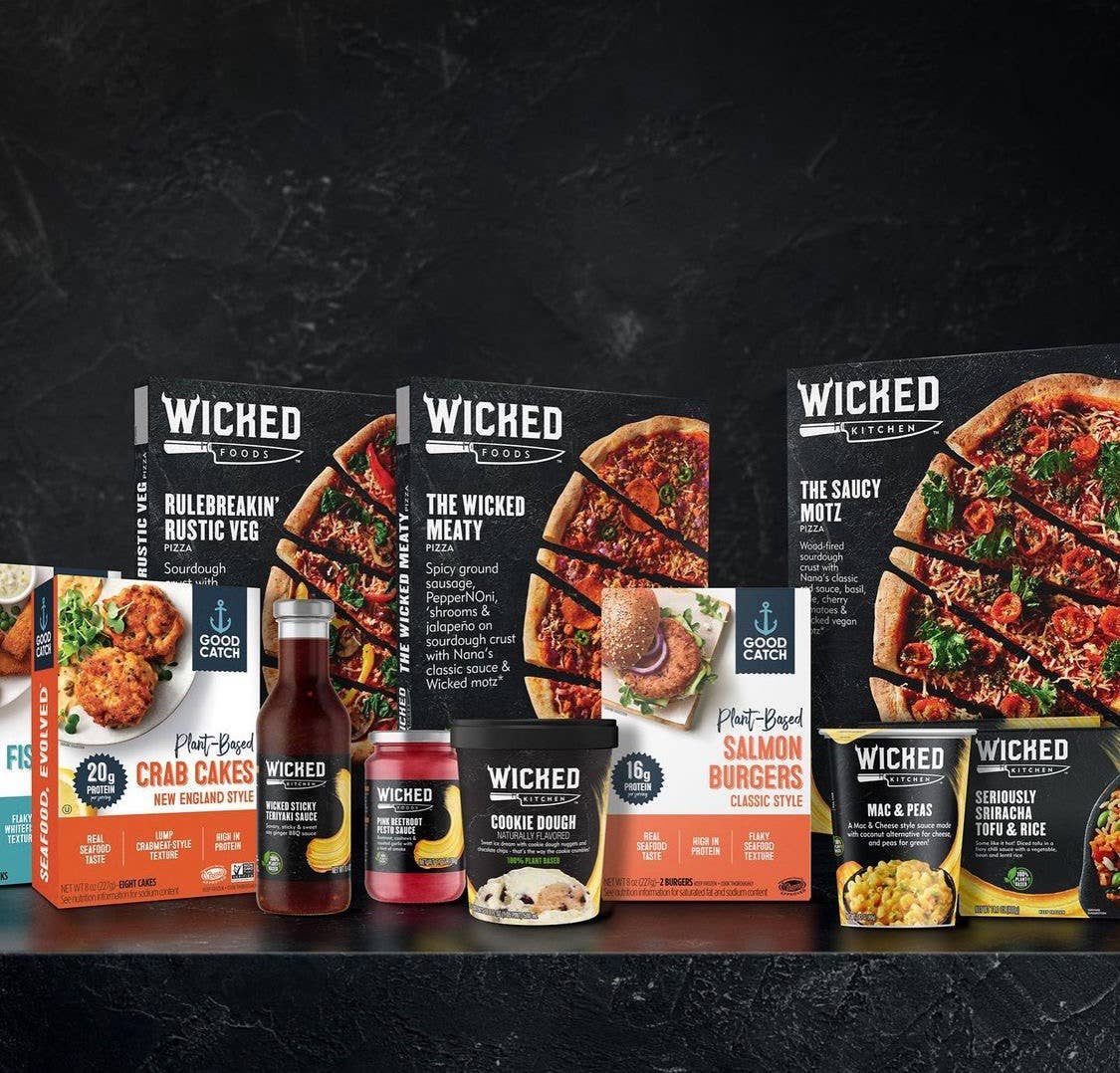
Cargill CEO Predicts Plant-Based Protein Will Cut Into the Meat Market
It's no secret that the sales of plant-based foods continue to surge, as consumer preferences shift and more Americans say they want to eat meatless products more of the time. Companies from Nestle to Cargill have shifted focus to begin creating more plant-based products to meet the growing demand, and now David MacLennan, CEO of the food giant Cargill predicts that plant-based protein will significantly cut into the sales of meat, noting that he and his company are aware of the changing consumer preferences.
“Our analysis is that in three to four years plant-based will perhaps be 10 percent of the market. We’re a large beef producer and that is a big part of our portfolio,” MacLennan said. “So there’s some cannibalization that will occur.”
Right now, 70 percent of Americans say it would be healthier if people ate less meat and 58% would like to eat more fruits, vegetables, nuts, and whole grains, according to a 2020 survey by the food market research firm Datassential, according to a Bloomberg Green article. Meanwhile, the plant-based food industry is projected to grow to 100 times larger by 2050, according to an industry report produced by the investment bank Credit Suisse.
Global food giants commit big investments into plant-based products
But with global giants like Nestle building a $100 billion plant in China to produce meat-free options, and Cargill has also announced its intentions to launch a line of plant-based products in China, while McDonald's, KFC, and others have begun to roll out plant-based parties and nuggets, the future seems clearly biased toward a public that craves choice.
Suddenly what once looked like a niche market, owned by Impossible Foods and Beyond Meat, is taking a giant step into the mainstream. MacLennan made his comments at the National Grain and Feed Association convention, where he revealed that Cargill is researching plant-based protein alternatives using corn as its base. (Beyond uses pea protein and Impossible uses soy protein.) The company hopes to enter the plant-based protein industry to compete with these pioneering companies and be better prepared for the future market profile where more than half of consumers now self-identify as "flexitarians," who lean into plant-based eating but do not cut out all meat or consider themselves plant-based or vegan.
“We’re not only thinking about North American launches, but across the globe,” Cargill released in a statement to Food Navigator. “Corn protein is a great protein for meat alternatives because it’s got a great neutral flavor profile and really good performance.”
Cargill starting investing in the plant-based industry for its North American and Asian branches, claiming that it aims to produce plant-based proteins that will rival Beyond Meat and Impossible Foods. Beyond its products, Cargill also plans to develop food ingredients that it will supply to other food companies globally. The company also recently partnered with PURIS Foods to become the largest North American distributor and manufacturer of pea protein.
“PURIS is a game-change in terms of taste and vertical integration in pea protein,” Vice President of Cargill Starches, Sweeteners, and Texturizers David Henstrom said. “Cargill is excited to expand into the emerging pea protein space while continuing to support our conventional agricultural crops. It’s clear that PURIS is in alignment with Cargill’s vision to meet the growing demand for protein globally and to help customers deliver label-friendly products without sacrificing taste.”
The meat company launched its first plant-based protein chicken at three locations of fast-food restaurant KFC in China. The trial saw substantial success, leading to Cargill debuting its PlantEver plant-based brand across China. The PlantEver brand includes plant-based chicken nuggets and burger patties. Following that success, Cargill co-branded a range of plant-based foods with Japanese-based company Lawson that featured vegan scallops and plant-based chicken tenders.
The meat industry - specifically the beef sector - continues to face pressure from the consumer base. As more consumers discovered the link between environmental damages and the meat industry, meat is put in the spotlight as a risky, unsustainable market.
"Beef is under a whole lot of pressure," director of Yale University's Program on Climate Change Communications. "It was the shift in the market forces that was the death knell for coal. And it's the same thing here. It's going to be the shift in consumer tastes and preference, not some regulation."
With environmental issues at the forefront, American consumers are shifting away from meat-heavy diets. A 2020 survey found that seventy percent of consumers believe that ditching meat is healthier. Beyond that, the report discovered that 5 percent of consumers would like to eat more plant-based foods such as whole grains, vegetables, fruits, and nuts.
Tyson Foods also moved towards the plant-based sector earlier this year. The company released its Raised & Rooted range of plant-based foods at retailers nationwide. The company hopes to capitalize on a growing plant-based clientele, marking another time a giant meat distributor felt impacted by the plant-based consumer behavior.
Top 10 Sources of Plant-Based Protein According to a Nutritionist
1. Seitan
Protein: 21 grams in ⅓ cup (1 ounce) Seitan isn’t as popular as other proteins, but it should be! Made from wheat gluten, its texture resembles ground meat. It’s often used in pre-made veggie burgers or meatless nuggets. Seitan has a savory taste, like mushrooms or chicken, so it works well in dishes that call for an umami flavor. With a hearty texture, seitan can be the star of practically any vegan main dish. Add it to stir-fries, sandwiches, burritos, burgers, or stews. Like tofu, seitan will take on the flavor of any marinade or sauce.
2. Tempeh
Protein: 16 grams in 3 ounces If you like a protein with a bit of bite, add tempeh to your list. Made from fermented soybeans, tempeh has a slightly nutty flavor and is pressed into a block. Most varieties include some sort of grains, such as barley or millet. Not only is tempeh a plant-based source of protein, but the fermentation process also creates good-for-your-gut probiotics. You can cut tempeh right off the block and use it as the base for a sandwich or pan-fry it with some sauce. Or, crumble, heat, and make it the star of your next taco night.
3. Lentils
Protein: 13 grams in ½ cup cooked Lentils come in multiple varieties--red, yellow, green, brown, black. Regardless of the type lentils are small but mighty nutritional powerhouses. They pack a good amount of protein as well as iron, folate, and fiber. When cooked, brown lentils retain their texture and can be the base for a grain bowl or make a hearty substitute for ground meat in meatballs, lasagna, tacos or Bolognese. Red lentils are a bit softer and make a nice add-in for a hearty soup, chili, or stew.
4. Hemp Seeds
Protein: 10 grams in 3 tablespoons Hemp seeds are a tender and nutty seed, derived from the hemp plant. They contain good amounts of omega-3s, iron, folate, magnesium, phosphorus, and manganese. They are also a solid source of both soluble and insoluble fiber, which helps to keep your digestive tract healthy and humming. Because they pack a double whammy of protein and healthy fats, hemp seeds can help satisfy hunger, preventing those embarrassing stomach growls as you slog your way to your lunch break. Add them to your morning smoothie or sprinkle them on top of yogurt, oatmeal, or even a salad.
5. Tofu
Protein: 9 grams in 3 ounces (⅕ of a block) Made from coagulated soybeans, tofu is the most popular plant-based protein. Soy is one of the only meatless "complete" proteins, meaning that it contains all of the essential amino acids that the body can’t make but needs for muscle and immune function. With 15% of your daily calcium needs, tofu is also a good replacement for dairy.
6. Edamame
Protein: 9 grams of protein in ½ cup This sushi appetizer is a nutrient powerhouse, so eat it anytime. Edamame is really just another name for soybeans in their pods. Let’s list off some stats--a small ½-cup serving of edamame has 9 grams of protein, 15% of your daily vitamin C, 10% of your daily iron and 16% of your daily fiber. Keep a bag of edamame in your freezer to serve as a fun-to-eat side dish or opt for the shelled variety to toss into salads or a grain bowl.
7. Quinoa
Protein: 8 grams per cup (cooked) Quinoa is an ancient grain and since it's gluten-free a great choice for anyone avoiding gluten. Add it to your burger recipe to create filling texture, or instead of meat in your taco or burrito. Quinoa is among the healthiest foods on the planet, delivering phytonutrients that have anti-inflammatory qualities, so keep it in your pantry for any meal that needs a filling grain. Just remember to soak it and rinse before cooking to get rid of any bitter taste.
8. Black Beans
Protein: 7 grams in ½ cup (canned) Eating beans on the regular might as well be a prerequisite for a plant-based diet. Not only are canned black beans inexpensive, but they also contribute 10% of your daily iron and 25% of your daily fiber to your diet. For less than $1 a can, beans can be the star of tacos, quesadillas, salads, soups, burgers, or dips.
9. Amaranth
Protein: 6 grams in ⅔ cup (cooked) Chances are you’ve never cooked amaranth. But you should, since this tiny, gluten- free grain is packed with almost 30% of your daily fiber and 20% of your daily iron. Cook it like a traditional grain to yield a soft, porridge-like texture. Many people add amaranth to other a hot breakfast cereal mixture, like oats and quinoa. It also pops like popcorn. Toss it in a pot with some oil and wait for it to pop up into a nutritious snack.
10. Peas
Protein: 5 grams in ⅔ cup If peas were one of your most hated veggies as a kid, it’s time to give them another chance. These green beans are a great low-calorie protein to keep in your freezer. Sure, they don’t always taste great when steamed or microwaved (who wants to eat mushy, overcooked peas?), but they do blend well into a yummy puree that can be slathered on toast. To amp up the flavor, add some lemon juice or mint to your mix before you blend.
More From The Beet






